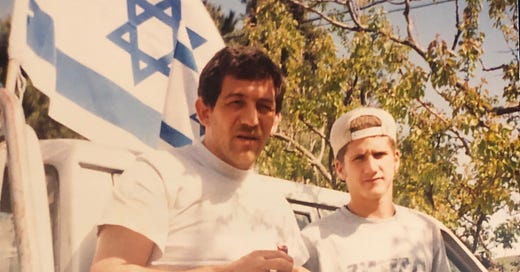April 1994
31 years ago, I got to know my Israeli cousins and felt the full weight of their politics.
When I was growing up my family held our Israeli cousins in softly high esteem. They were seen as the brazen, bold members of our extended family. Maybe a bit unpolished, but more importantly they were the selfless pioneers we could all be proud of. They were the sturdiest of us and hardiest of us and we imagined them dodging Lebanese rockets and tiptoeing around exploding buses with grit, grace and righteous anger.
My great uncle Mordechai (formerly Morton) “Morty” Dolinsky originally moved to Israel in 1956, then again permanently in 1970. In the mid-70s, he lived with his wife and growing family in a tiny settlement called Tekoa, which at the time was nothing more than a few trailers on a pebble-strewn, wind-swept hill. Later the growing family moved to a sprawling house in the Jewish Quarter of the Old City of Jerusalem.
Throughout childhood and young adulthood I was inculcated with the triumph of Zionism — the miraculous story of the birth of the modern Jewish state, something that was impossible only 50 years prior, as Jews were seeking to escape the persecution and suffering they faced in Europe.
In grade school, classmates of mine routinely jetted off to Israel for Winter Break, and I was always asked why I wasn’t doing the same. Finally, I did, deferring my first year of college to participate in a yearlong Israel immersion program, in which about 120 of us lived, studied, volunteered, travelled and attempted to integrate into Israeli culture. I spent time on a moshav (best described as a semi-collective farm) where I communicated entirely in Hebrew; I shot an M16 on a low-priority army base; and I frequently travelled about the country on buses by myself. Many of the routes I rode are now off-limits, clotted with army checkpoints or lost behind the “Security Wall.”
The Israeli Dolinskys were aware that I was living in Israel that year, 1993 to 1994. One weekend, Yossi came to Jerusalem with his wife and two children and ‘kidnapped’ me, in order to embark upon a self-styled mission to “save” me from being brainwashed by a left-wing, bleeding heart, “Peace Now” propaganda machine. He and his relatives were adamant that I being fooled by the program into believing that Arabs were actually human beings and worse, that they had an identity as Palestinians who claimed residence on the land they knew rightfully belonged to Jews.
Of the five Cousins, I became closest with the middle son, Yossi, a hardscrabble, roughneck type who spoke English with a strong New York accent. He lived in Haifa in a small but spotless apartment. I saw his brother, Zevvy the youngest of Morty’s kids, as a kind of Holden Caufield type, someone I could get along with on a different level, and for the most part I did. He was about ten years older than me. That year, I probably saw the two of them the most.
I vividly recall Yossi taking me aside and pointing with purpose —as militant zealots so often do-- to a hillock a mile or so in the distance and declaiming, “See that Arab over there? He would sooner slit your throat than give you a glass of tea. He wants to kill you and make no mistake about it. You’ve got to kill him first.”
That year my great uncle became terminally ill, and in April, he died. I missed the funeral because I was in the midst falling in love with a girl and wanted to stay with her a bit longer before taking the 4-hour bus ride back to Jerusalem. I had a vague Idea of where the funeral home was and ultimately wended my way there only to arrive in time for a different funeral. I remember asking an attendant in Hebrew, “is this the Dolinksy funeral?” He responded with a look of confusion mixed with disdain, as if he knew why I’d arrived late. Needless to say, the cousins weren’t too happy with me.
I made it up to them by accompanying Yossi and Zevvy to the gravesite for the unveiling 30 days later, as is the Jewish custom. On the way to the Mount of Olives where my uncle was buried, I sat between them in the front seat of Yossi’s beat-up truck as we bounced through the streets of East Jerusalem. The truck’s yellow license plates identified us as Israelis traveling through a Palestinian enclave in what was, in April of 1994, a potentially hostile stretch of road to drive.
Suddenly I heard a “tick” on the windshield glass, and before I could even register what was happening, Yossi had reached across me from the driver’s seat, opened the glove compartment and pulled out a Glock. Just as swiftly, he aimed out of the driver’s side window and fired off a couple of shots. I glimpsed two kids, who looked to be 8 or 9 years old, ducking behind a cement wall.
“I got him, I got him.” Yossi said. His voice was resolute, not scared, angry or triumphant.
One of the kids had apparently thrown a small rock at the truck, cracking the windshield. In response, my cousin tried to kill them.
15 minutes later, we were standing at the gravesite around the newly unveiled stone, intoning the monotonous refrains of mourner’s kaddish. Before we left, we all grabbed pebbles that happened to be just about the size of the one that hit Yossi’s truck, and placed them solemnly on the gravestone.
My cousins’ campaign to convert me ultimately failed. In fact, I am very strongly against the preemptive murder of a presumptive enemy, or murder of any kind at all.





